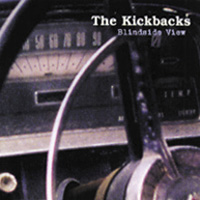 Fun
Fun
with Alicia Witt, Renee Humphrey, William R. Moses and Leslie Hope
Directed by Rafael Zelinsky
(1997)
by Katy Shea
Hillary (Renee Humphrey, backwards baseball cap and over-alled to teen angst perfection), is coming from an appointment with her counselor and Bonnie (Alicia Witt, wild eyed and frenetically leaping about) is running away when they meet at a bus stop, get tired of waiting and decide to walk/ hitchhike together. The barely teenage pair proceed to throw rocks into windshields from an overpass, ride around in shopping carts, shoplift, play video games, run around frantically and generally act like zany and madcap 15 year olds. The rush these two feel while together builds quickly into a lust for the freedom to “do this every day,” and “be together forever.” After knocking on random doors and screaming obscenities at unwitting suburbanites (ostensibly looking for Hillary’s old foster home to “cuss out” her old foster mom) the jubilant duo make a hasty plan to get inside one of the houses and “do whatever they need to do,” to steal enough money to get away together and have more of this unbridled “fun,” that makes them feel more alive then they have ever felt before in their lives.
The punch line of this hedonistic voyage is the subsequent murder of a little old lady who is waiting for her daughter to call and take her to Bingo. Bonnie gets so caught up in the obvious euphoria of stabbing a fragile elderly woman repeatedly in the chest that she must be pulled off of the woman by her cohort Hillary (the poetry writing, tortured, misunderstood one) and dragged to a local gas station to get washed up.
Later, the two are discovered in their pajamas, peacefully snuggling with each other fast asleep in Hillary’s sweet 15 year old bed by the police, who are sorry to have to upset such a scene of apparent innocence, and are carted off to jail.
The movie actually opens in black and white with their jail counselor, played with appropriate deadpan hopelessness by Leslie Hope, reluctantly awaiting the arrival of a reporter (William R. Moses) from Tomorrow Magazine (representing the evil exploitative tabloid media) who is scheduled to interview the young killers. Their story is told through the interviews that follow, each non-sequential flashback filmed in vibrant color, contrasting with the sullen, constrictive grays and whites of the prison scenes (duh).
There are moments in the film where the characters elicit some kind of empathy for their eudemonistic motivations. Their utter lack of hope of ever finding any real kind of happiness by living the disdainful “normal” lives that surround them, and their contempt for adults who give them no reason to think there is anything better waiting for them is understandable, yet doesn’t quite resonate somehow.
I suppose it is shocking that two young girls could kill with such an absence of remorse, and likewise you could jump on the “our modern media has created a generation desensitized to violence and removed from reality to the point where this kind of crime is the logical result” bandwagon, but I think the point is best made in Hillary’s prison monologue where she muses that the cavemen probably never needed to remind themselves that they were alive. Her Hobbesian ideals and the notion of modern society’s progression being maybe not so progressive are well-taken, but the film itself is not terribly shocking or powerful. Witt’s over-emotive spastic acting is distracting and although the bond of love and despair between the two girls is almost believable, the movie communicates its point mudilly, and immediately afterwards I was disappointed. However, the resonance of the ideas in the film is coming to me now, days after viewing it. Worth a watch.



